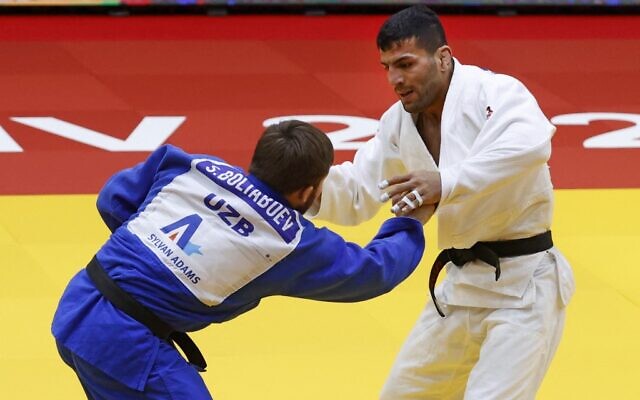Judo’s world body issued a four-year ban against the Iranian Judo Federation over Tehran’s demands that its athletes refuse to face Israeli opponents.
The ban was backdated to begin in September 2019, when Iranian judoka and former world champion Saeid Mollaei left the Iranian team during the World Championship in Tokyo, saying he was ordered to throw matches and withdraw from competitions in order to avoid facing Israeli competitors.
The International Judo Federation initially responded to the Iranian order with an open-ended ban on Iran’s team participating in international judo competitions. That initial ban was overturned in March by the Court of Arbitration for Sport.
After an Iranian appeal of the initial suspension, the court found that the Iranian federation had “committed severe violations of the IJF rules” on discrimination and should be punished, but ruled that the international body overstepped its authority with the severity of the ban. It sent the case back to an IJF disciplinary panel for review.

Iranian judoka Saeid Mollaei speaking with a German representative after deciding to stop competing for Iran. (Courtesy IJF)
At the time, the Iranian federation hailed the lifting of its suspension as a “great legal and sporting victory,” and said it hoped the decision would lead to an “improvement” in relations with the International Judo Federation.
The new four-year ban will expire on September 17, 2023.
In its Thursday announcement, judo’s global governing body referred to Iran’s behavior as “extremely severe offenses” and “repeated and severe breaches” of international judo’s statutes and “the fundamental principles of Olympism.”
The case began when Iran’s government ordered Mollaei to withdraw from the 2019 championship to avoid facing Israeli judoka Sagi Muki. At the Court of Arbitration for Sport, the IJF noted that Mollaei had previously lost bouts at the Abu Dhabi Grand Slam and The Hague Grand Prix in 2018 when he could have faced Muki had he won.

Israeli world champion judoka Sagi Muki, right, and Iranian champion Saeid Mollaei embrace at the Paris Grand Slam, February 10, 2020, in an Instagram photo posted online by Muki. (Instagram screen capture)
Mollaei first inquired with the IJF about changing nationality in November 2018, a month prior to the judoka losing in his first-round match to a Japanese athlete at the Guangzhou World Masters when he once again found himself in the same pool as Muki.
Mollaei then lost at the Paris Grand Slam in February 2019 when on course to face Muki, before winning a bronze medal. He did not attend the medal ceremony.
The incident in Tokyo in 2019 appeared to be the last straw. Mollaei refused to return to Iran and instead sought asylum in Germany.
Mollaei switched allegiances to Mongolia last year and first represented that country in a competition in Israel, the IJF Tel Aviv Grand Slam in February of this year, where he claimed a silver medal in the men’s under-81 kilograms category after being defeated by Paris 2020 Grand Slam finalist Sharofiddin Boltaboev of Ukraine.

Iranian-born Mongolian judoka Saeid Mollaei (white) competes against Uzbekistan’s Sharofiddin Boltaboev during the finals of the men’s under-81kg category of Tel Aviv Grand Slam 2021 in the city of Tel Aviv, on February 19, 2021. (Jack Guez/AFP)
When approving Mollaei’s switch to Mongolia, the International Olympic Committee said the change did not need permission from Iranian Olympic officials because the judoka was technically a refugee.
While in Israel, Mollaei told Israel’s Kan public broadcaster, “I’m competing only for Mongolia. I no longer compete for Iran. That part is over for me… I’ve always been a sportsman. I’ve never engaged in politics.”
Mollaei said Israel had been “very kind. That is something I will never forget.”
Related posts:
Views: 0
 RSS Feed
RSS Feed

















 April 30th, 2021
April 30th, 2021  FAKE NEWS for the Zionist agenda
FAKE NEWS for the Zionist agenda  Posted in
Posted in  Tags:
Tags: 
















